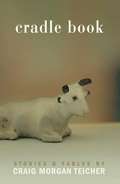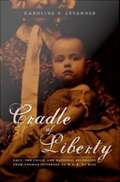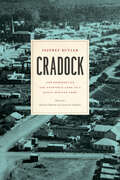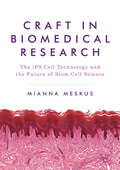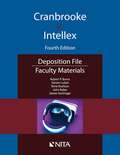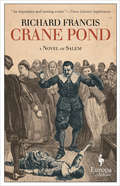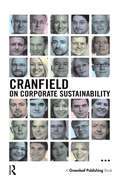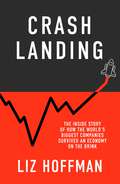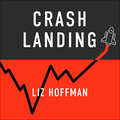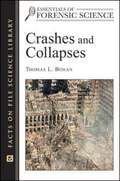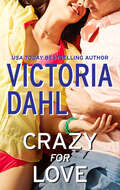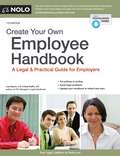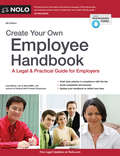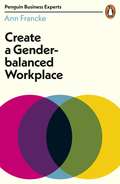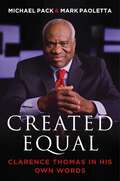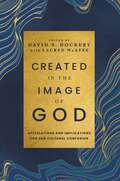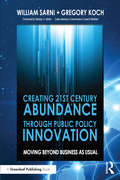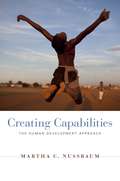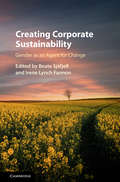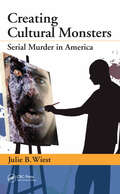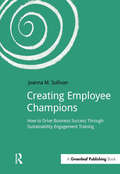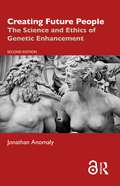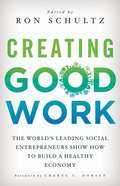- Table View
- List View
Cradle Book (American Readers Series)
by Craig Morgan TeicherTimeless yet timely and hopeful with a dark underbelly, these fables revive a tradition running from Aesop to W.S. Merwin. With a poet&’s mastery, Craig Morgan Teicher creates strange worlds populated by animals fated for disaster and the people who interact with them, or simply act like them, including a very sad boy who wishes he had been raised by wolves. There are also a handful of badly behaving gods, a talking tree, and a shape-shifting room.Craig Morgan Teicher is poetry editor of Publishers Weekly and a vice president on the board of the National Book Critics Circle. He lives in Brooklyn, New York.
Cradle of Liberty: Race, the Child, and National Belonging from Thomas Jefferson to W. E. B. Du Bois
by Caroline F. LevanderThroughout American literature, the figure of the child is often represented in opposition to the adult. In Cradle of Liberty Caroline F. Levander proposes that this opposition is crucial to American political thought and the literary cultures that surround and help produce it. Levander argues that from the late eighteenth century through the early twentieth, American literary and political texts did more than include child subjects: they depended on them to represent, naturalize, and, at times, attempt to reconfigure the ground rules of U. S. national belonging. She demonstrates how, as the modern nation-state and the modern concept of the child (as someone fundamentally different from the adult) emerged in tandem from the late eighteenth century forward, the child and the nation-state became intertwined. The child came to represent nationalism, nation-building, and the intrinsic connection between nationalism and race that was instrumental in creating a culture of white supremacy in the United States. Reading texts by John Adams, Thomas Paine, Harriet Beecher Stowe, Augusta J. Evans, Mark Twain, Pauline Hopkins, William James, Jos Mart, W. E. B. Du Bois, and others, Levander traces the child as it figures in writing about several defining events for the United States. Among these are the Revolutionary War, the U. S. -Mexican War, the Civil War, and the U. S. expulsion of Spain from the Caribbean and Cuba. She charts how the child crystallized the concept of self--a self who could affiliate with the nation--in the early national period, and then follows the child through the rise of a school of American psychology and the period of imperialism. Demonstrating that textual representations of the child have been a potent force in shaping public opinion about race, slavery, exceptionalism, and imperialism, Cradle of Liberty shows how a powerful racial logic pervades structures of liberal democracy in the United States.
Cradock: How Segregation and Apartheid Came to a South African Town (Reconsiderations in Southern African History)
by Jeffrey ButlerCradock, the product of more than twenty years of research by Jeffrey Butler, is a vivid history of a middle-sized South African town in the years when segregation gradually emerged, preceding the rapid and rigorous implementation of apartheid. Although Butler was born and raised in Cradock, he avoids sentimentality and offers an ambitious treatment of the racial themes that dominate recent South African history through the details of one emblematic community. Augmenting the obvious political narrative, Cradock examines poor infrastructural conditions that typify a grossly unequal system of racial segregation but otherwise neglected in the region’s historiography. Butler shows, with the richness that only a local study could provide, how the lives of blacks, whites, and mixed-race coloreds were affected by the bitter transition from segregation before 1948 to apartheid thereafter.
Craft in Biomedical Research: The iPS Cell Technology and the Future of Stem Cell Science
by Mianna MeskusThis book explores the new ways in which biology is becoming technology. The revolutionary iPS cell technology has made it possible to turn human skin and blood cells into pluripotent stem cells, thus providing an unprecedented opportunity to study the pathophysiology of diseases, understand human developmental biology, and generate new therapies. Drawing from a rich ethnographic study, Meskus traces the making of the iPS cell technology through the perspectives of clinical translation, laboratory experimentation, and tissue donation by voluntary patients. Discussing non-human agency, the embodied and affective basis of knowledge production, and the material politics of science, the book develops the idea of an instrumentality-care continuum as a fundamental dynamic of biomedical craft. This continuum, Meskus argues, opens up a novel perspective to the commercialization and industrial-scale appropriation of human biology, and thereby to the future of ethical biomedical research.
Crafting Courts in New Democracies
by Matthew C. IngramThe role of Latin American courts in facilitating democracy and economic liberalization is considerable. But while national 'high courts' have been closely studied, the form, function, and empowerment of local courts are still not well understood. In Crafting Courts in New Democracies, Matthew C. Ingram fills this gap by examining the varying strength of local judicial institutions in Brazil and Mexico since the 1980s. Combining statistical analysis and in-depth qualitative research, Ingram offers a rich account of the politics that shape subnational court reform in the region's two largest democracies. In contrast to previous studies, theoretical emphasis is given to the influence of political ideas over the traditional focus on objective, material incentives. Exhaustively researched and rigorously presented, this book will appeal to scholars and policymakers interested in the judiciary, institutional change, Latin America, the causal role of ideas, justice reform, and the rule of law.
Cranbrooke v. Intellex: Faculty Material
by Steven Lubet Robert P. Burns Terre Rushton John T. Baker James H. SeckingerIntellex, an ambitious US video game company, comes into conflict with Cranbrooke, a traditional manufacturer of children’s games for the European market. Their dispute? The terms of a contract for Cranbrooke to license and manufacture Intellex’s newest virtual reality system. Cranbrooke claims that the new system is an improvement over the original system and therefore covered by the terms of the contract and that it has the exclusive right to distribute Intellex's virtual reality products in the European Union for at least five years. Intellex counters that the new system is no more an “improvement” than compact discs were merely an improvement on phonograph records and that Cranbrooke’s contract only provided a first right of refusal on innovative new products. At stake are distribution rights for the improved system throughout the European Union. The fourth edition of Cranbrooke is a substantial update over previous versions. The Cranbrooke offices have been moved to fictional Brittania to avoid any Brexit conflicts. Exhibits have been updated to reflect modern business practices, including text messaging. Expert witness reports have been updated to reflect more realistic pricing. And the game system in dispute has been modernized. This international contract case file provides the flexibility that you’ve been looking for. It comes in formats that can be used as a fact investigation file, a deposition file, or trial file on liability or damages or both. The Trial file contains all witness depositions and documents. The Deposition versions reflect the reality of deposition practice, when each party only has certain documents: the Plaintiff file contains materials only available to the plaintiff side to aid in prepping for depositions; the Defendant file contains materials only available to defendants; the Faculty file contains both the plaintiff and defendant material and is for instructor use. The plaintiff and defendant each have three witnesses, including accounting experts for each side.
Crane Pond: A Novel of Salem
by Richard FrancisThis novel of the Salem Witch Trials from the point of view of a judge is &“leavened with wit [and] finely crafted&” (Kirkus Reviews). In a colony struggling for survival, in a mysterious new world where infant mortality is high and sin is to blame, Samuel Sewall is committed to being a loving family man, a good citizen, and a fair-minded judge. Like any believing Puritan, he agonizes over what others think of him, while striving to act morally correct, keep the peace, and, when possible, enjoy a hefty slice of pie. His one regret is that months earlier, he didn&’t sentence a group of pirates to death. What begins as a touching story of a bumbling man tasked with making judgments in a society where reason is often ephemeral quickly becomes the chilling narrative we know too well. And when public opinion wavers, Sewall learns that what has been done cannot be undone. Crane Pond explores the inner life of a well-meaning man who compromised with evil and went on to regret it. At once a searing view of the Trials, an empathetic portrait of one of the period&’s most tragic figures, and an indictment of the malevolent power of idealism, it is a thrilling new telling of one of America&’s founding stories. &“[Crane Pond] goes straight on to my (small) list of historical novels that draw out the capacities of the form and allow readers to brush against the pleasures and terrors of the past.&” —Hilary Mantel, author of Wolf Hall &“Deftly crafted . . . perfectly balances issues of religion, faith, and law.&” —Library Journal
Cranfield on Corporate Sustainability
by David GraysonBusiness schools have a special contribution to make in developing globally responsible, critical and independent-thinking future leaders and managers. In fact, the Cranfield School of Management acknowledges this as one of its important responsibilities. Its core ideology is to transform the practice of learning and create leaders who action their knowledge and become stewards of the common good. Such thinking forms the basis of this book and its theme of developing responsible and ethical leaders for next-generation enterprises. These leaders will be passionate, purposeful and responsible; their primary aim will be to make a difference in the lives of people and create sustainable value premised on sound ethical values. This book aims to provide a roadmap both for business students – the leaders of tomorrow – and for existing and engaged leaders who need support, coaching and counselling to address the challenges of the sustainability agenda. With contributions from more than thirty Cranfield faculty and associates across multiple management disciplines, the book emphasizes the need for cross-disciplinarity when confronting sustainability dilemmas. Many corporate responsibility practitioners find themselves isolated from core business issues. Conversely, many managers in traditional departments have little or no knowledge of what sustainability and corporate responsibility means to their day-to-day role. Today, there is an urgent need for learning, for conversation and for sustainability to become embedded throughout an organization's DNA. Cranfield strives to prepare its students for a work milieu that is increasingly complex, diverse, technologically interconnected, socially networked and where economic and political power shifts see emerging-market economies assuming significant global prominence. This makes for exciting challenges but also requires new mind-sets for the next generation of business men and women. Corporate responsibility, and the tough ethical and governance choices managers have to grapple with, where there are no easy answers, means that business education must embrace the stakeholder model. Leaders need to be able to negotiate their way with confidence around multiple perspectives and conflicting and common interests of stakeholders such as employees and managers, shareholders, trade unions, suppliers and civil society organisations. Business schools need to generate understanding of and sensitivity to this new and changing world of work. Today, the challenge for business schools and business itself is to establish a new maxim: "the business of business is sustainable business". Cranfield on Corporate Sustainability is designed to stimulate debate about what sustainable development means for business and, therefore, on what business schools across the globe should research, teach and advise. This unique book is a manifesto for a new holistic, embedded approach to corporate sustainability management education.
Crash Landing: The Inside Story Of How The World's Biggest Companies Survived An Economy On The Brink
by Liz HoffmanIt was the ultimate test for CEOs, and almost none of them saw it coming.__________In early March 2020, with the Dow Jones flirting with 30,000, the world's biggest companies were riding an eleven-year economic high. By the end of the month, millions would be out of work, iconic firms were begging for bailouts, and countless small businesses were in freefall. Slick consulting teams and country-club connections were suddenly of little use: business leaders were fumbling in the dark, tossing out long-term strategy and making decisions on the fly-decisions, they hoped, that might just save them.In Crash Landing, award-winning business journalist Liz Hoffman shows how the pandemic set the economy on fire-but if you look closely, the tinder was already there.Based on astonishing access inside some of the world's biggest and most iconic companies, this is a gripping account of the most remarkable period in modern economic history, revealing how they battled against an economic catastrophe for which there was no playbook: among them, AirBnB's Brian Chesky, blindsided by a virus in the middle of a high-stakes effort to go public; American Airlines's Doug Parker, shuttling between K Street and the White House, determined to secure a multi-billion-dollar bailout; and Ford's Jim Hackett, as his assembly lines went from churning out cars to ventilators.Crash Landing reveals the fear, grit, and gambles of the pandemic economy, while probing its implications for the future of work, corporate leadership, and capitalism itself, asking: Will this remarkable time give rise to newfound resilience, or become just anothercostly mistake to be forgotten?__________A gripping account of the financial carnage of the pandemic, revealing the fear, grit, and gambles that drove the economy's winners and losers.
Crash Landing: The Inside Story Of How The World's Biggest Companies Survived An Economy On The Brink
by Liz HoffmanAn exposé of the billionaires who built the US economy on sand, and the virus that saw it crumble.A kaleidoscopic account of the financial carnage of the pandemic, revealing the fear, grit, and gambles that drove the economy's winners and losers-from a leading Wall Street Journal reporter.Crash Landing takes readers behind the scenes of an unprecedented period of global economic turmoil, letting readers into the inner lives of the men and women trying to save big business from the brink.The world's most powerful CEOs never saw it coming, especially after a decade of growth that saw them riding high. Then whispers of a new flu-like illness became a crescendo, and by the end of March 2020 ten million people were out of work, iconic firms were begging for bailouts, and countless small businesses were in freefall.How do you sustain a workforce that can no longer work? How do you ride out a crisis that has no end in sight? How do you prepare for a recovery in a new world? Liz Hoffman pulls back the curtain on the most violent few months in the modern global economy, taking readers inside boardrooms, onto factory floors and into trading pits. Featuring original interviews with the people responsible for the economy, and in charge of making sure it survives. A gripping story of big business and even bigger characters, Crash Landing will appeal to fans of Michael Lewis and Andrew Sorkin. This is an audiobook that gives you the inside scoop, and answers the most important question of today: Will this remarkable time give rise to newfound resilience, or become just another costly mistake to be forgotten?(P) 2022 Hodder & Stoughton Limited
Crashes and Collapses
by Thomas L. BohanCrashes and Collapses includes a collection of stories based on real cases involving the forensic engineering sciences. It may surprise those whose view of forensic science has been formed by those television shows to learn that a large fraction, perhaps most, of forensic work involves the engineering sciences and that this has been the case since ancient times. This book is about some of that work and is aimed at introducing curious adults as well as middle- and high-school students to the world of forensic science in such a way that they will be better able to evaluate what they hear and see about forensic investigations and also about the broader world within which these investigations take place.
Crazy for Love
by Victoria DahlChloe Turner thought she was going to marry the perfect man-until her fiancé's plane crashed. And then she got the really bad news: he'd tried to fake his own death to avoid marrying her. Now America's most famous bridezilla (a tag she most definitely does not deserve), Chloe escapes to a remote island to avoid the paparazzi. And right next door is a man who just might be the cure for Chloe's heartache....A magnet for wild, complicated women, Max Sullivan is relieved to have finally found someone "normal." Chloe is his girl-next-door fantasy come to life, and best of all, she gets him. With her, he can be himself, a treasure-hunting millionaire who desperately wants out of his sexy but reckless job. But when Chloe's notoriety catches up with them, will their torrid romance make it to the mainland?
Create Your Own Employee Handbook
by Lisa Guerin Amy DelpoCreate a handbook for employees, spelling out your company's benefits, policies and procedures using this practical legal guide Every company, no matter how big or small, needs to provide workers with an employee handbook. Create Your Own Employee Handbook gives you the information and policies all managers, HR professionals and business owners need to create their own reader friendly guide, no matter what state you live in. Each chapter covers a different topic, including: . at will employment . hiring . pay and payroll . workdays and hours . performance evaluations . benefits . discrimination and harassment . complaints and investigations . leave . health and safety . substance abuse . privacy in the workplace . discipline You'll get the lowdown on the legal and practical considerations that apply to each topic in your state, plus sample policies that you can use as is or tailor to meet your needs. You can even cut and paste the language you need to complete your own handbook instantly. This edition is completely updated to reflect recent changes to federal and state law, and covers emerging workplace issues such as healthcare reform law and social networking policies. Download forms for book at nolo.com.
Create Your Own Employee Handbook: A Legal & Practical Guide for Employers
by Lisa Guerin Amy DelpoMake—or update—your employee handbook today with this user-friendly guide! Every company should have an employee handbook to communicate with employees, manage workers effectively, ensure consistent treatment across the organization, and protect itself from lawsuits. But creating a handbook from scratch can be daunting—and hiring a lawyer to draft one can easily cost thousands of dollars. That where Create Your Own Employee Handbook can help. It provides everything managers or HR professionals need to create an effective handbook—or update an existing one—all in plain English. Inside, you’ll find up to date legal information, practical suggestions, and policy language on: wages and hours at-will employment time off discrimination and harassment email, social media, mobile devices, and other workplace technology drugs and alcohol complaints and investigations workplace privacy, and much more. The 8th edition is completely updated to include state law changes affecting employer policies, such as meal and rest breaks; minimum wage laws (including rules for restaurant servers and other employees who receive cash tips); smoking in the workplace; drug and alcohol testing; discrimination; jury duty; family and medical leave; and much more. The 8th edition also covers the latest rules and practices for workplace technology (including employee posts on personal or business social media sites and use of employee-owned smart phones for work).
Create a Gender-Balanced Workplace (Penguin Business Experts Series)
by Ann FranckeEquality at work expert Ann Francke reveals how to understand and tackle the damaging consequences of gender imbalance in the workplaceGender balance is first and foremost a business issue. McKinsey estimates we could add 28 trillion to global GDP if we achieved gender equality everywhere - that is more than the GDPs of the US and China combined. But it's so much more than that. Gender balance is one of the best levers we can pull to build better managers and leaders at every level, improve team performance and create better cultures where everyone can thrive.In the Penguin Experts: Create a Gender-Balanced Workplace, Ann Francke, the CEO of the Chartered Management Institute (CMI), introduces her solution to combating the problems at the heart of the continued imbalance and offers clear, actionable strategies for making a positive change in your organisation.
Created Equal: Clarence Thomas in His Own Words
by Michael Pack Mark PaolettaDrawing on historical documents and exclusive interviews, authors tell the inspiring story of Clarence Thomas's rise from a childhood of poverty and prejudice in the segregated South to Supreme Court Justice. Companion to blockbuster documentary Created Equal: Clarence Thomas in His Own Words, but a fascinating stand alone read, as well!*The full story behind the wildly successful documentary film, Created Equal: Clarence Thomas in His Own Words* Born into dire poverty in the segregated South and abandoned by his father as a child, Justice Clarence Thomas triumphed over seemingly insurmountable odds to become one of the most influential justices on the Supreme Court. Yet after three decades of honorable service, few know him beyond his contentious confirmation and the surrounding media firestorm. Who is Justice Clarence Thomas, in his own words? In the follow-up to the wildly successful documentary by the same name, Created Equal builds on dozens of hours of groundbreaking, one-on-one interviews with Thomas to share a new, expanded account of his powerful story for the first time. Producer Michael Pack and Mark Paoletta, a lawyer who worked alongside Thomas during his confirmation, dive deep into the Justice&’s story. Drawing on a rich array of historical documents and unreleased conversations with Thomas, his wife, and those who knew him best, Created Equal is a timeless account of faith, race, power, and personal resilience.
Created in the Image of God
by Dr. David DockeryAll people have dignity because they are created in the image of God. This theological belief has been a liberating force among its believers, providing a myriad of beautiful implications in our world. On the other hand, where the idea of being created in God&’s image has been misunderstood, the implications can be devastating. Created in the Image of God brings together leading experts to discuss what it means to be made in image of God and to bring clarity and guidance for implications in the midst of our cultural confusion. The overall approach of this work, though distinct and focused in each of the chapters, reflects a consensus understanding that men and women have been created in God&’s image, that they have fallen and are influenced by sin, that Christ has provided redemption through his vicarious death and resurrection, and that there is hope in the promise of eternal life in Christ. Christ succeeded where Adam failed (Rom 5:12-21; 1 Cor 15), allowing those who trust in him to enjoy and glorify him forever. The rich chapters within, and their helpful application to human dignity issues, will help our world to regain a sense of the marvelous privilege that is ours as image bearers and how that should impact our engagement with complex dignity issues of our day.
Creating 21st Century Abundance through Public Policy Innovation: Moving Beyond Business as Usual
by Greg Koch William SarniOne of the greatest challenges of the 21st century is the problem of how the public and private sectors can sustain economic development, business growth, social well-being and ecosystem health in the face of accelerating demand for water, energy, and food. "Business as usual" projections of scarcity in water, energy, and food predict a lack of these resources sufficient to sustain economic and business growth as well as an adequate standard of living worldwide. Developments in technology are well documented, but this is the first book to explain the role of innovation in public policy and governance, a topic which is frequently overlooked and often frustrates developments in technology and business. Without innovation in public policy and governance, innovation in technology solutions will face persistent headwinds for adoption. The book showcases these innovations and creates a roadmap of what needs to change to drive economic development, business growth, social wellbeing and ecosystem health in the 21st century.
Creating Capabilities: The Human Development Approach
by Martha C. NussbaumIn this powerful critique, Martha Nussbaum argues that our dominant theories of development have given us policies that ignore our most basic human needs for dignity and self-respect.
Creating Capabilities: The Human Development Approach
by Martha C. NussbaumIf a country’s Gross Domestic Product increases each year, but so does the percentage of its people deprived of basic education, health care, and other opportunities, is that country really making progress? If we rely on conventional economic indicators, can we ever grasp how the world’s billions of individuals are really managing? In this powerful critique, Martha Nussbaum argues that our dominant theories of development have given us policies that ignore our most basic human needs for dignity and self-respect. For the past twenty-five years, Nussbaum has been working on an alternate model to assess human development: the Capabilities Approach. She and her colleagues begin with the simplest of questions: What is each person actually able to do and to be? What real opportunities are available to them? The Capabilities Approach to human progress has until now been expounded only in specialized works. Creating Capabilities, however, affords anyone interested in issues of human development a wonderfully lucid account of the structure and practical implications of an alternate model. It demonstrates a path to justice for both humans and nonhumans, weighs its relevance against other philosophical stances, and reveals the value of its universal guidelines even as it acknowledges cultural difference. In our era of unjustifiable inequity, Nussbaum shows how—by attending to the narratives of individuals and grasping the daily impact of policy—we can enable people everywhere to live full and creative lives.
Creating Corporate Sustainability: Gender As An Agent For Change
by Beate Sjåfjell Irene Lynch FannonThis compelling volume considers three significant modern developments: the ever-changing role of women in society; a significant and growing dissatisfaction with current dominant understandings of corporate governance, corporate law and corporate theory; and the increasing concern to establish sustainable business models globally. <P><P>A range of female scholars from across the globe and from different disciplines interconnect these ideas in this unique collection of new and thought-provoking essays. Readers are led through a carefully planned enquiry focussing initially on female activism and the corporation, secondly on liberal attempts to include women in business leadership and, finally, on critiquing the modern focus on women as a 'fix' for ethical and unsustainable business practises which currently dominates the corporate world. <P>This collection presents a fresh perspective on what changes are needed to create the sustainable corporation and the potential role of women as influencers or as agents for these changes.<P> Connects feminist experience with corporate law and theory and sustainability, discussing issues such as female community activism, female business leadership and legal attempts to include women in decision-making in corporations.<P> Pushes the boundaries of current thinking in corporate governance ideas and challenges the increasingly gendered approaches to questions of corporate ethics to present a positive connection between these issues and sustainability.<P> An overarching emphasis on sustainability and how to create more sustainable corporate activity leading to new ways of thinking about these issues.
Creating Cultural Monsters: Serial Murder in America
by Julie B. WiestProviding a comprehensive exploration, this volume explains connections between American culture and the incidence of serial murder, including reasons why most identified serial murderers are white, male Americans. Presenting empirically supported arguments that have the potential to revolutionize how serial murder is understood, this volume includes an illustrated model that explains how people utilize cultural values to construct lines of action according to their cultural competencies. It demonstrates how the American cultural milieu fosters serial murder and the creation of white male serial murderers and provides a critique of the American mass media‘s role in the notoriety of serial murder.
Creating Employee Champions: How to Drive Business Success through Sustainability Engagement Training
by Joanna SullivanDisengaged employees cost companies billions in lost productivity and high turnover rates. Integrating sustainability into the soul of your business can unleash an "upward spiral" of engagement, and turn your employees into sustainability champions.Making business sustainability part of the job description drives employees towards collaboration, community and commitment. It transforms employees into authentic brand ambassadors and companies into movements. In addition, companies that embed sustainability are better positioned to anticipate and adapt to changing market conditions.Creating Employee Champions offers a three-step method for sustainability engagement training, and a paradigm shift in employee engagement and business sustainability. Use it to transplant NGO DNA into business DNA, so you can inspire hearts and minds, engage employees, foster dynamic commitment to meet sustainability goals and equip employees to engage with external stakeholders.
Creating Future People: The Science and Ethics of Genetic Enhancement
by Jonathan AnomalyCreating Future People offers readers a fast-paced primer on how advances in genetics will enable parents to influence the traits of their children, including their children’s intelligence, moral capacities, physical appearance, and immune system. It explains the science of gene editing and embryo selection and motivates the moral questions it raises by thinking about the strategic aspects of parental choice. Professor Anomaly takes seriously the diversity of preferences parents have, and the limits policymakers face in regulating what will soon be a global market for reproductive technology. Anomaly argues that once embryo selection for complex traits happens it will change the moral landscape by altering the incentives each person faces. All of us will take an interest in the traits everyone else selects, and this will present coordination problems that previous writers on genetic enhancement have failed to consider. Anomaly ends by considering how genetic engineering will transform humanity.Key Updates to the Second Edition Significant revisions to include more details about what will be scientifically possible in the coming years and the moral issues these developments will raise. New and substantial coverage of embryo selection (guided by polygenic scores) for minimizing the risk of genetic diseases. Engagement with all important, new publications on the science of genetic enhancement
Creating Good Work
by Ron SchultzWhile social entrepreneurship continues to grow by leaps and bounds over the last decade, practitioners have begun to realize that no one model can be used for every type of social venture. Be it a start-up for enhancing the educational opportunities a community has access to or a program to address the sustainability of a region's environment, each type of social venture comes with its own hardships and pitfalls on its path to creating a better tomorrow. Creating Good Work is a practical resource that goes beyond storytelling. It is a rich guide book recounts the stories of some of the most successful social entrepreneurial programs operating today, with real life examples of and how they overcame both physical and societal barriers to create a lasting impact on the world they encounter. Including contributions from leading names at such social ventures as Benetech, Brac-USA, KivaRoot Capital, Skoll Foundation, 7th Generation, and YouthBuild, many of whom have been recognized by organizations like the Skoll Foundation and Ashoka: Innovators for the Public as being among the world's best. The lessons these leaders share contained in this volume are an asset to any social entrepreneur looking for new and innovative ways to have a positive impact on change the world around them, be they at their initial concept phase or a successful venture looking to expand their sphere of influence.
